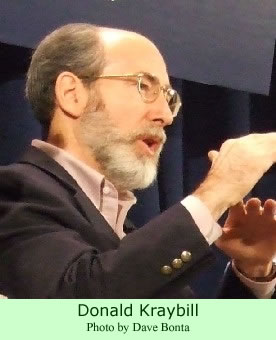Donald Kraybill, famed expert on the Amish, announced last week that he will retire as of the end of June from his positions at Elizabethtown College in Lancaster County, Pennsylvania. He has taught college classes and has served as Senior Fellow at the Young Center for Anabaptist and Pietist Studies at the college. He will continue to pursue his research on the Amish from his home in the community of Elizabethtown.

An article in Lancasteronline.com described Kraybill’s relations with the Amish and the many highlights of his academic career. He grew up in a Mennonite family on a farm in Lancaster County. As a young man, he worked as a research assistant to John Hostetler at Temple University in Philadelphia. Hostetler was one of the leading authorities on the Amish before Kraybill.
Kraybill gained notice as an expert on the Amish when the 1985 movie “Witness,” filmed in large part in Lancaster County, was released. He received many requests from media representatives about how the Amish reacted to the movie. He personally thought it tried to give a sensitive portrayal of Amish society, but many local plain people resented the fact that the leading actress, Kelly McGillis, had spent a week living with an Amish family under false pretenses. She had not been honest with her hosts by telling them she was going to have a leading role in a movie, and when they found out later, they resented her deception.
Kraybill’s book The Riddle of Amish Culture, published in 1989, became a standard reference source on the society. That same year, the Young Center opened its new building on the Elizabethtown campus, with Kraybill as its director. He has continued to turn out scholarly books about the Amish in rapid succession ever since then.
In October 2006, when a gunman opened fire in a one-room Amish schoolhouse at Nickel Mines, in Lancaster County, Kraybill and others at the Young Center worked hard to keep up with calls from the news media around the world. Kraybill, of course, using the trust he had gained from the Amish community, could serve as a spokesperson for them as well as an interpreter of their views to the outside world. The Amish parents of the slain children trusted him to convey to the news media one of the essential tenets of their belief system, the importance of forgiveness, in this case for the murderer and his family—a message that inspired the world.
Six years later, a much more negative, but also widely publicized, news story about the Amish occurred in Bergholz, Ohio, when a renegade sect attacked dissident members of their group by forcefully cutting their hair and beards. Kraybill once again was called upon as an expert on the Amish. “I see Nickel Mines as a story of the best of Amish belief and faithful to the highest virtues. I see the renegade Bergholz Amish as the negative side,” Kraybill told the reporter last week.
Kraybill also reacted to the hype about the so-called reality television show “Amish Mafia.” While many people in the Lancaster area are appalled by the false images that the show creates, Kraybill has a different take on it. According to him, the program serves to show the Amish themselves “how foolish and crazy the outside world really is.”
Lancasteronline quotes numerous people who have nothing but praise for the scholarship and integrity of the retiree. Sam Stoltzfus, an historian and owner of a machine shop in Gordonville—who is, himself, an Amish man—said that he has always trusted Kraybill. “He was sensitive and he was also sympathetic. He just knew how to put it in words,” Stoltzfus said.
Other scholars of the Plain People also praised Kraybill to the news service. Jeff Bach, who is currently the director of the Young Center, said that Kraybill has gained his amazing access to the Amish due to his integrity. The Amish people respect him because he is able to understand the complex forces that guide Amish thinking—the ways they change, yet their various reasons for sometimes not changing.
Karen Johnson-Weiner, a co-author of books with Kraybill and herself an expert on the society, said that he effectively serves Amish interests because he translates their culture so well to the “English”—the rest of the people of North America. He saves the Amish from being invaded by the press, and he fosters an interest in their society. Steven Nolt, another collaborator with Kraybill, praises his colleague for being sensitive and not idealizing or sentimentalizing the Amish.
The reporter quotes Kraybill as saying he does not see himself as an advocate for the Amish or as their protector. As a result of his face-to-face visiting with them, he says he has learned to really understand them well. “I see my vocational responsibility to try to interpret their beliefs and practices with sympathetic understanding of what they do, why they do it and try to explain it in truthful fashion without sensationalism and hyperbole.”
According to the article, Kraybill has so far authored or co-authored 28 books on the religion, culture, economy, and society of the Amish.